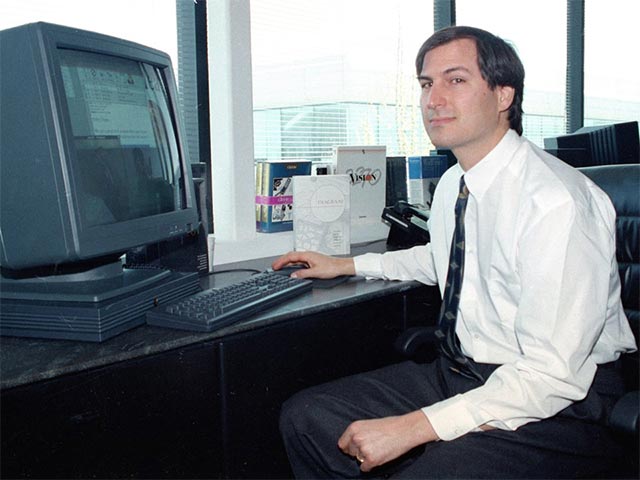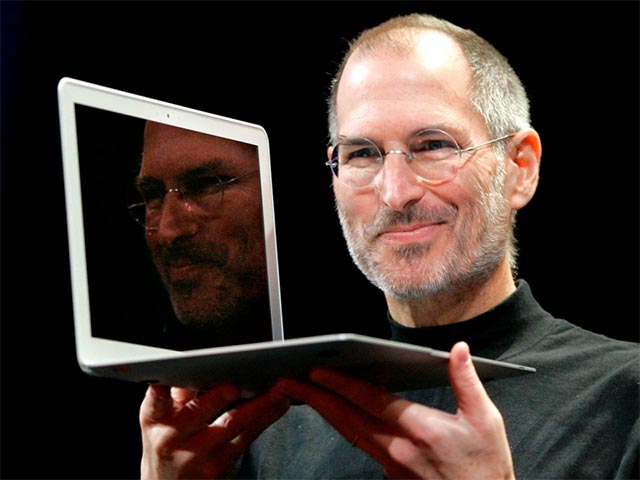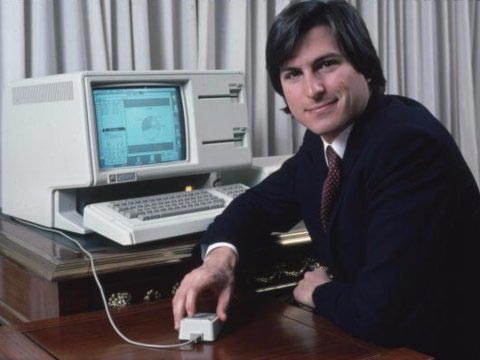Steve Jobs and eight words of 'thunder' have come true in the technology world
It has been 8 years since Steve Jobs - a legend of the technology world - broke up with humanity, but his name is constantly mentioned, honored at every conference, or even the competition. controversy about the future of the technology world. Simply by Steve Jobs, with an extremely deep and passionate understanding, and a burning survey of the mission to change people's lives, has given deep predictions about the future of the public domain. technology, and the fact has proven that most of the views that Apple co-founders are completely accurate, or even valuable, guide the long-term future of the technology world.
Since 1976, that is when Steve Jobs became Apple's co-founder, he was considered a "leader" in the revolution of micro-computing, with a vision to expand into the mobile sector. and user service. The achievements of smartphones, tablets, music sharing services, applications and everything else have been contributing positively to the mobile user experience that we have witnessed today. has Steve Jobs's mark with his vision.

- Steve Jobs and the simple secret of making speeches come into people's hearts
By creating revolutionary pioneering technology products, Steve Jobs gradually transformed himself into a true prophet. After all, like one of his favorite sayings: "The best way to predict the future is to invent it," the future for Steve Jobs is the creation that originates today.
However, Steve Jobs is just a normal man, he still has the same misconceptions as others. So what are the famous 'thunder' words that Steve Jobs left for posterity? How did they happen? What is right and wrong? We will find out later.
Steve Jobs and the fulfilled prophecies
'We will use computers to entertain every day at home, right in our private space.'
In 1985, in an interview with Playboy, Steve Jobs once said that the use of personal computers in the future will spread to every street, house, and not merely a working tool at stuffy offices anymore. At that time, computers were mostly used primarily by companies, schools, and public agencies. Only a few large business executives accept to install computers to be able to work at home when necessary.
According to statistics from the US Census Bureau, even in the United States - the world leader in developing and applying technology to everyday life - only about 8% of households own computer at home. While by 2015, this number has increased to 79%.
And just as Steve Jobs predicted, computers are now an indispensable daily entertainment source for millions of people, whether watching movies and TV, playing games or texting, chatting with friends. At the same time, these versatile machines become even more compact, powerful and become an essential part of modern life.
"We will all be connected through computers."
- This is why Steve Jobs once claimed to destroy Android until his last breath
Also in that interview, the Apple boss gave the most convincing explanation to the question of why in the future, people would have to have a computer page right in their living space, that is "to connect with an extremely large media cyberspace on a national, even multinational scale. "
So far it can be seen that Jobs's comment is completely accurate. Not only in an organization, community or country, the level of connectivity here has been pushed to new heights, on a global scale. Less than four years after the "prophecy" of the Apple co-founder, Tim Berners-Lee successfully developed the World Wide Web and only one year later, in 1989, the first website was also posted online. The route, signaling the era of internet globalization has really started, and peaked as we witnessed today.
'All essential functions on the computer, such as cutting and pasting documents . will be done quickly with a device called a computer mouse.'
- Working as an engineer for 15 years at Apple, but when it comes to demoing Steve Jobs products like this
Before Steve Jobs released his Lisa computer in 1983, most personal computers at the time required users to tap hard on the keyboard, as well as use many other key operations. each other to perform basic document processing tasks, very time consuming. When Jobs introduced his computer mouse, he surprised the world by performing all of the above commands through the mouse in an intuitive, simple, and extremely fast way. At the same time, Jobs believed that using the mouse was easy, even for those with little computer training, and his belief was completely accurate.
35 years later, computer mice still play a role, important in this work of many people, but are gradually being replaced by new advances in touch screen technology, by Apple itself and many other technology companies developed and popularized, accompanied by the explosion of mobile devices. In the near future, it is very likely that Apple's popularity of touch screen technology via iPhone and iPad will one day put an end to the computer mouse.
"The dial signal used to access the web will appear everywhere"
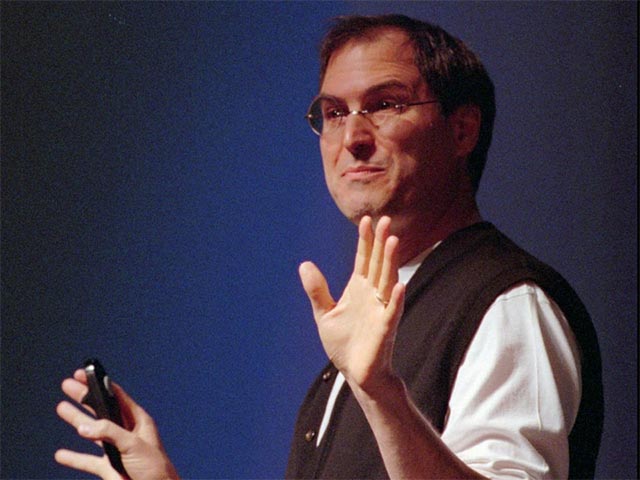
- This is the first phone announced by Apple and it is not iPhone
In a widely-known interview between Steve Jobs and the 1996 Wired technology magazine, Apple boss made a prediction that the web platform will be accepted and used by many people around the world.
Currently, the world has gone through a period of relying on dial-up internet access, but Steve Jobs once again shows its breath-taking vision when it comes to the popularity of the web. By April 2019, it is estimated that as many as 4.4 billion people worldwide use the Internet regularly, equivalent to about 56% of the global population.
'You may no longer have to manage your personal repository yourself.'
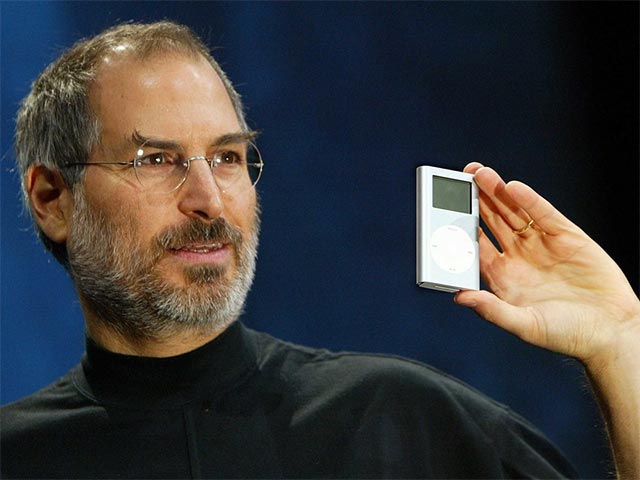
Long before we all started storing photos, videos and data in the current Apple, Google, or Amazon cloud services, Steve Jobs once emphasized the need to provide Users use a variety of new personal storage distribution methods.
Also in the framework of an interview with Wired magazine in 1996, Jobs said: 'Storage management is an extremely important job while using computers in general. We take a lot of time every day for this work, and that may disappear in the future. In the next few years, you won't have to spend too much time managing your memory and archives, service providers will help you. '
Steve Jobs also added that he almost does not store anything on his device. In return, the CEO will use email and the web, and therefore, he will not have to spend too much time managing hosting. Even the favorite way of reminding you of your favorite job is to email yourself.
Apple's strategy of "turning a great computer into a compact device like a book"
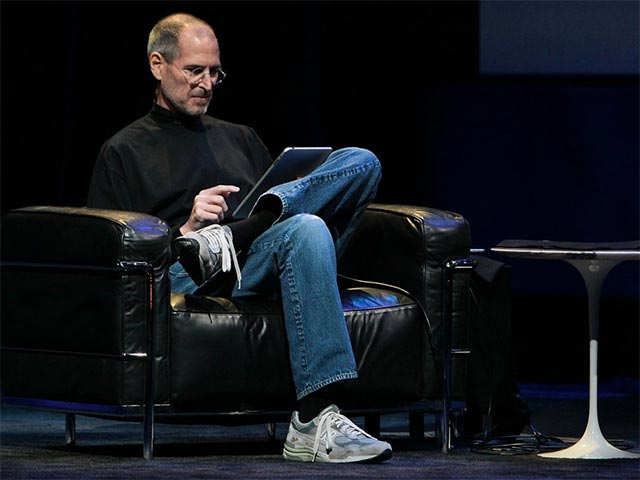
- Rare photos of the first days of Apple
You may not know but at the time of the 80s of the last century, computers were literally bulky machines. They are large, heavy and extremely occupying an area, so they are mostly used in laboratories or factories and offices. But in a speech at the International Design Conference held in 1983, Steve Jobs showed his strategic vision of a computer with high mobility, even to the point of being able to carry follow me. Specifically, Jobs talked about a computer the size of a book that 'you can take with you and read for 5 minutes' - which almost appears only in fantasy stories at the time. .
In an interview with Newsweek a few weeks later, he added: "I always thought it would be great if everyone could own a small box, the size of a book or a student board. You can take with you and work wherever you are. "
Going back to the reality of 2019, perhaps we don't need to say anything more about this prophecy. What Jobs described 35 years ago is very much like the iPad, Kindle tablet, or smartphone that is in your pocket.
Machines will be able to estimate people's thoughts and desires
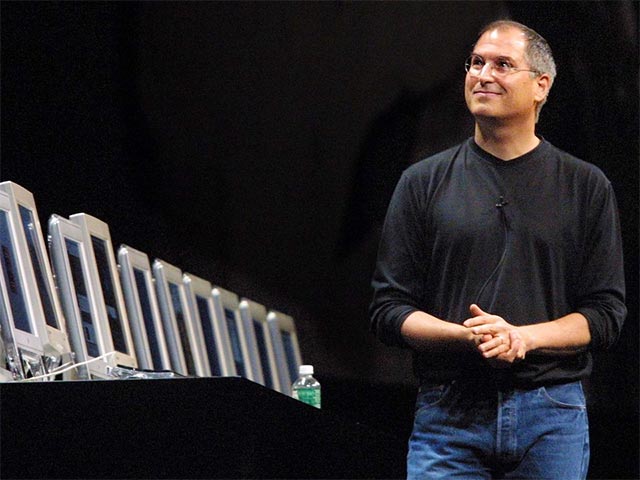
- Steve Jobs defines object-oriented programming to make the world admire
According to Steve Jobs, there will be 'little people living inside the box that can predict what you want.' That's the Apple co-founder's statement in an interview with Newsweek magazine in 1983. Specifically rather, the CEO described in the future, computers will be 'assistants', able to learn our interests, then analyze, store information, and use that information to interacting with us as well as learning how to anticipate all the needs of the employer - what Jobs calls "a little friend living in a box".
Nearly 30 years later, Alexa, Siri or Google Assistant have appeared and become indispensable virtual assistants in many people's daily lives, just like what Steve Jobs predicted. And the romance between Joaquin Phoenix and a virtual assistant AI in the movie "Her" probably won't be a fantasy anymore.
'Instead of going to the store, people will sit home surfing and shopping'
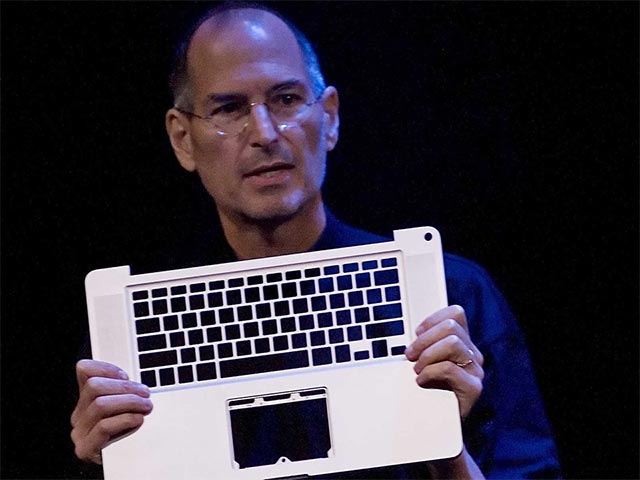
- 13 famous inspirational lessons about life from Steve Jobs
In a speech before the Organization of Computer Information Technology Awards in 1995, Steve Jobs once argued that the global web platform will have a profound impact on every aspect of human life, and humanity. will feel the most significant change occurring in the trade-consumer sector. According to the legendary CEO, the internet will allow small startups to minimize the cost of maintaining the system and distributing products, and can compete directly with larger corporations by delivery. translate directly with consumers without going through any costly intermediaries (product stores, agents).
As a result, as we have seen, it can be said that the 21st century is the era of e-commerce. Today, there are millions of companies trading on the internet, from small suppliers to e-commerce giants like Amazon, Alibaba or eBay. At the same time, this convenient form of trade also receives the response of billions of people worldwide.
Before the e-commerce sector flourished today, Jobs had issued a warning to conservative businesses, "not daring" to change to join the online business: 'People won't. go to the stores but instead, they will buy things on the web. Big companies that don't pay attention to this change will be left behind and lose their market. '
Jobs's prediction was fulfilled in America. While Walmart's largest retail chain stores are still closing in, leading e-commerce businesses such as Amazon, eBay, BestBuy have gradually become tycoons in the shopping world. , collecting billions of dollars in sales over the Internet, and still expanding the scale every day.
'Future sources of information will become so abundant that it will exceed the capacity of human reception.'
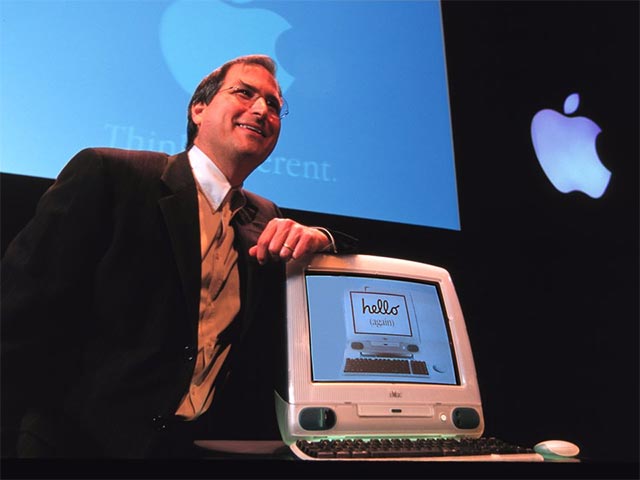
- iPhone will never exist if Steve Jobs doesn't hate a director at Microsoft
In 1996, when mankind was still eager for the first email delivery and receipt tests to appear, it seemed that few could imagine that we would soon enter the era when the amount of information was generated. will even exceed human ability to receive. Steve saw this fact and talked about it in an interview with Wired magazine in 1996, mentioning that information overload can make the lives of many people turn upside down.
According to a large-scale survey conducted by Deloitte, at present, every American opens a phone to check information sent more than 52 times a day. This can be SMS, email, or news alerts from instant messaging, social networking applications.
The impact of technology on people will be increasingly rejuvenated according to the general development in this area
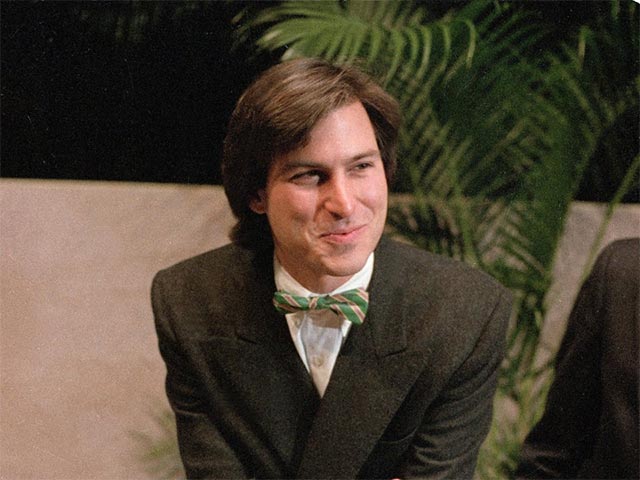
- Former employee compared Steve Jobs to Tim Cook, showing why Apple became boring
This is probably one of Steve Jobs's most astonishing predictions, involving young people's access to the emerging technology market - an area that is traditionally reserved only for adults. city.
In an interview with Newsweek's Access, he explained that in the future, it is very likely that children will be exposed and use technology right from the age of 10 and this will somehow negatively affect Physical development as well as perfecting personality for children, especially when they are too fond of technological devices that ignore learning and entertainment by rewarding physical activities.
And Steve Jobs's judgment is absolutely correct, a study by Influence Central reported that at present, the average age that a US child owns their first phone is 10.3 years old. Meanwhile, the harmful effects of young children who are too passionate about technology are things that we still listen to everyday on the mass media.
Steve Jobs and the predictions of 'banana peeling'
"There will be many innovations in the software field, not hardware."
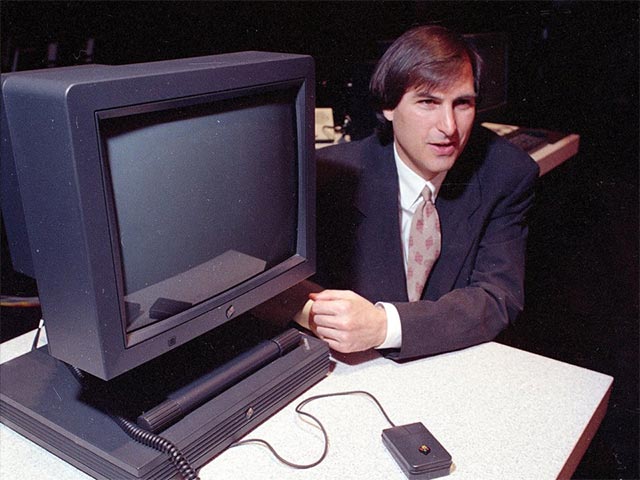
- Read the "11 rules of success" of a former Apple employee who learned the first day of work!
As mentioned, Steve Jobs is also human and therefore, despite owning a mindset beyond the age, he does not always make 100% accurate predictions.
In an interview with Playboy in 1983, Jobs said that new software was the area that received the most innovation, not hardware. Meanwhile, Apple's biggest rival in PC manufacturing is IBM. Jobs said: "Most new, creative companies are focusing heavily on software innovation. I think there will be many innovations going on in the software sector, not hardware."
But in fact, it is the new software that is less competitive than hardware. For decades, Microsoft has always been a leader in desktop software, leading to a 'choking' grip on lesser-known businesses in this area, to the extent that the US government must investigate an investigation of monopoly behavior and unfair competition with Microsoft.
Today, the battle on the piece of software called 'easier', but generally still dominated by 3 big names: Microsoft, Apple and Google. While the hardware war is much more dramatic, with big names like Samsung, Dell, HP, Acer, Lenovo, Huawei, Asus, and many other manufacturers. This is one of Steve Jobs's false predictions.
'Is the birth of the web an event that will change the lives of millions of people? Is not!'
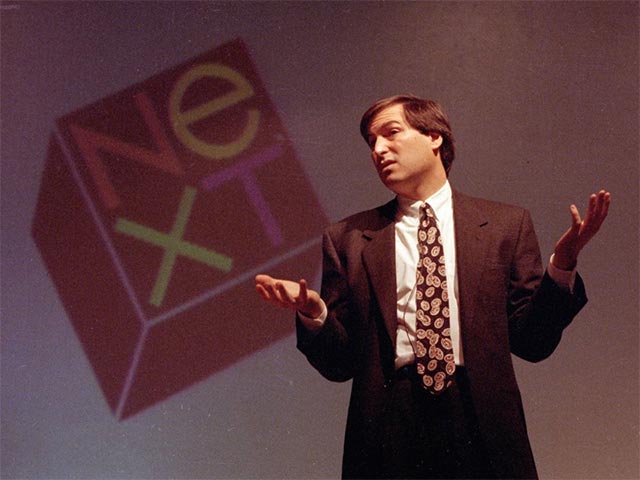
- The way that Steve Jobs created 'unlimited warriors' who do bosses must know
This is a rather contradictory prediction of Apple founder. After all the achievements Jobs has achieved, it seems that he underestimated the overall impact of the web on human life. Or, it could be that the CEO is just being humble when he interviews with Wired in 1996.
"The web will be very important. But is this the event that changes the lives of millions of people? I'm afraid not, perhaps. I am not sure about that but perhaps in the near future, a The comprehensive change that the web creates for human life will hardly happen. '
And the result is as we know it. The web has crept into every breath, the aspect of global life. How many of us do not have access to the internet every day to serve our commercial needs, social interaction, entertainment, knowledge and news? Probably not much. And Steve Jobs was once again wrong.
These are prophecies that have become the truth of Steve Jobs' false predictions about every aspect of the technology world. Thereby, we can better understand the profound thinking as well as the vision beyond his era - one of the genius technology engineers, who have invaluable contributions to the development of full science and technology. demand, as well as contribute to bringing mankind a better life!
You should read it
- ★ Steve Jobs, the art of humanity, and the secret to achieving the goal
- ★ Career lessons from Steve Jobs
- ★ 3 stories in Steve Jobs' 'classic' speech at Stanford University
- ★ 5 things you can't forget about Steve Jobs 'technology witch'
- ★ The memorable product presentation presentations by Steve Jobs
